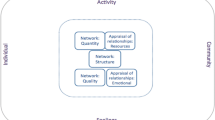Abstract
A majority of Americans participate in religious services and identify themselves as members of a faith community. Understanding the role that religion plays in people's lives is essential to developing a comprehensive model of social support during times of crisis. The purpose of the current study was to identify the resources of social support that are helpful for church members during times of crisis. Although research on the impact of social support has identified several types of support—and the function of such support—to people undergoing difficult times, researchers have not looked at the impact of religious beliefs and participation in religious communities on social support to any significant extent. The current study collected questionnaire data from 23 members of one congregation who experienced a personal crisis. Analysis of the data shows that religious beliefs and the support provided by the religious community were seen as extremely helpful in times of crisis. Implications for incorporating people's religious beliefs and participation in religious communities into future investigations of social support are discussed.
Similar content being viewed by others
References
Albrecht, T.L., Burleson, B.R., & Goldsmith, D. (1994). Supportive communication. In M.L. Knapp & G. R. Miller (Eds.) Handbook of Interpersonal Communication, 2nd ed. (pp. 419–449). Thousand Oaks, CA: Sage.
Altman, I., & Taylor, D.A. (1973). Social penetration. New York: Holt.
Antonovsky, A. (1979). Health, stress, and coping. San Francisco: Jossey-Bass.
Bradley, D.E. (1995). Religious involvement and social resources: Evidence from the data set “Americans' changing lives.” Journal for the Scientific Study of Religion, 34, 259–267.
Burleson, B.R. (1990). Comforting as social support: Relational consequences of supportive messages. In S. Duck with R. Solver (Eds.), Personal relationships and social support (pp. 66–82). London: Sage.
Caplan, G. (1964). Principles of preventive psychiatry. New York: Basic Books.
Caplan, G. (1976). The family as a support system. In G. Caplan & M. Killilea (Eds.) Support systems and mutual help (pp. 19–36). New York: Grune & Stratton.
Cassel, J. (1974). Psychosocial processes and “stress”: Theoretical formulations. International Journal of Health Services, 6, 471–482.
Cobb, S. (1979). Social support and health through the life course. In M.W. Riley (Ed.), Aging from birth to death (pp. 158–179). Boulder, CO: Westview Press.
Cobb, S. (1976). Social support as a moderator of life stress. Psychosomatic Medicine, 38, 300–314.
Cutrona, C.E., Suhr, J., & MacFarlane, R. (1990). Interpersonal transactions and the psychological sense of support. In S. Duck with R. Solver (Eds.), Personal relationships and social support (pp. 30–45). London: Sage.
Erikson, E. (1964). Childhood and society (2nd ed.). Rev. New York: W. W. Norton.
Gerkin, C. (1979). Crisis experience in modern life. Nashville: Abingdon Press.
House, J.S. (1981). Work stress and social support. Reading, MA: Addison-Wesley.
House, J.S., Landis, K.R., & Umberson, D. (1988). Social relationships and health. Science, 241, 540–544.
Kessler, R.C. (1979). A strategy for studying differential vulnerability to the psychological consequences of stress. Journal of Health and Social Behavior, 20, 100–108.
Larson, D.B., Sherril, K.A., Lyons, J.S., Craigie, F.C., Jr., Thielman, S.B., Greenwold, M.A., et al. (1992). Associations between dimensions of religious commitment and mental health reported in the American Journal of Psychiatry and Archives of General Psychiatry: 1978–1989. American Journal of Psychiatry, 149, 557–559.
Lazarus, R.S., & Folkman, S. (1984). Stress, appraisal, and coping. New York: Springer.
Leatham, G., & Duck, S. (1990). Conversations with friends and dynamics of social support. In S. Duck with R. Silver (Eds.). Personal relationships and social support (pp. 1–29). London: Sage.
Levitt, J.J., Guacci-Franco, N., & Levitt, J.L. (1993). Convoys of social support in childhood and early adolescence: Structure and function. Developmental Psychology, 29, 811–818.
Maton, K.I. (1989). Community settings as buffers of life stress? Highly supportive churches, mutual help groups, and senior centers. American Journal of Community Psychology, 17, 203–232.
McIntosh, D.N., Silver, R.C., & Wortman, C.B. (1993). Religion's role in adjustment to a negative life event: Coping with the loss of a child. Journal of Personality and Social Psychology, 65, 812–821.
Meehan, M.P., Durlak, J.A., & Bryant, F.B. (1993). The relationship of social support to perceived control and subjective mental health in adolescents. Journal of Community Psychology, 21, 49–55.
Pargament, K. (1990). God help me: Toward a theoretical framework of coping for the psychology of religion. Research in the Social Scientific Study of Religion, 2, 195–224.
Pittman, F. (1987). Turning points: Treating families in transition and crisis. New York: W. W. Norton.
Sarason, B.R., Pierce G.R., & Sarason, I.G. (1990). Social support: The sense of acceptance and the role of relationships. In B.R. Sarason, I.G. Sarason, & G.R. Pierce (Eds.). Social support: An interactional view (pp. 97–128). New York: Wiley.
Sarason, B.R., Sarason, I.G., & Pierce, G.R. (1990). Traditional views of social support and their impact on assessment. In B.R. Sarason, I.G. Sarason, & G.R. Pierce (Eds.), Social support: An interactional view (pp. 9–25). New York: Wiley.
Stone, H. (1991). The caring church: A guide for lay pastoral care. Minneapolis: Fortress Press.
Stone, H. (1993). Crisis counseling (Rev. ed.). Minneapolis: Fortress Press.
Stone, H. (1994). Brief pastoral counseling: Short-term strategies and approaches. Minneapolis: Fortress Press.
Author information
Authors and Affiliations
Rights and permissions
About this article
Cite this article
Stone, H.W., Cross, D.R., Purvis, K.B. et al. A Study of the Benefit of Social and Religious Support on Church Members During Times of Crisis. Pastoral Psychology 51, 327–340 (2003). https://doi.org/10.1023/A:1022537400283
Issue Date:
DOI: https://doi.org/10.1023/A:1022537400283




